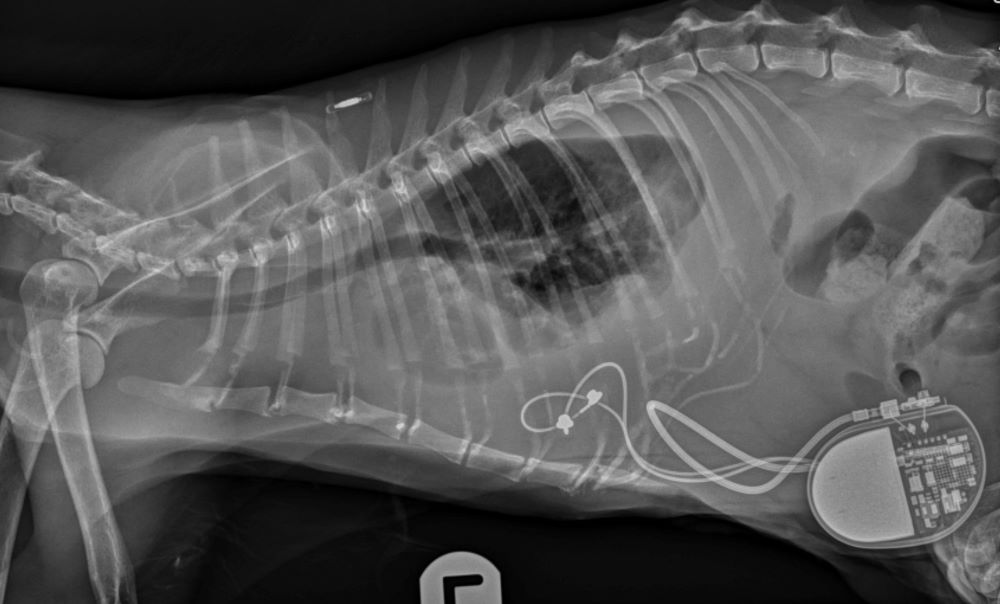In a special moment of animal care in India, a seven-year-old cat named Pillu has become the first in the country to be fitted with a pacemaker. These tiny gadgets help your heart beat properly. The procedure took place at the Raintree Veterinary Clinic & Rehabilitation Centre in Pune. Pillu’s story isn’t just about a medical breakthrough; it’s about love, hope, and the lengths vets to save our furry friends from suffering. Let’s break down what happened, what a pacemaker is, and why it matters, so everyone can understand.
Table of Contents
What is a Pacemaker?

Before we delve into Pillu’s story, we should probably talk about what a pacemaker is. A pacemaker is a small, battery-powered device that helps control the heartbeat. Picture your heart as a pump that needs a steady rhythm to transport blood around your body. Sometimes, the heart may beat too slowly or irregularly, causing a person (or a pet) to feel tired, weak, or very sick.
A pacemaker is like a little helper. It’s placed inside the body and connected to the heart with small wires. When the heart beats too slowly, the pacemaker sends tiny electrical signals to make it beat at the right speed. Pacemakers are a common sight in humans with heart problems, but they’re very rare in animals, especially cats. This is because the surgery is difficult and requires special training and expertise.
Pillu’s Heart Trouble
Pillu is an adult female cat who lives in Vishrantwadi, Pune, with her owner, Ajay Hirulkar. Two years ago, Ajay noticed that Pillu was not as agile as she used to be; she used to jump on the cupboard effortlessly but now she could hardly climb a chair. “I knew something was wrong,” he told The Times of India. Pillu was “tired, not eating, and was much quieter than before,” he added.
When he took her to a vet, it was found that Pillu’s heart was beating much slower than it should. A healthy cat’s heart normally beats around 160 times a minute, but Pillu’s heartbeat was in the range of 50–58! That was abnormally slow and could only mean one thing. The vets, including Dr. Leila Fernandez, a cardiac expert for animals, confirmed that Pillu had a serious condition known as a “third-degree heart block,” which meant that the electrical signals in her heart weren’t working properly, so the top and bottom parts of her heart weren’t working in sync.
Vets believed that the problem with Pillu’s heart may have started because of a gum infection she had a few years back, which could have spread to her heart. Though they also said that it could be because of her diet or something else, that can’t be verified. It was certain that Pillu needed help, and she needed it quickly.
A Big Decision: Pacemaker for Pillu
Pillu’s condition was so severe that the veterinary surgeons then decided to try something that had never been done in India before: implanting a pacemaker in a cat. It was a big step because, even for dogs, pacemaker surgeries are rare in India, never mind for cats. The surgery, which took place at Pune’s Raintree Veterinary Clinic, was conducted by Dr. Phiroz Khambatta with assistance from two human heart doctors, Dr. Rajesh Kaushish and Dr. Sonali Inamdar, and technical experts Zaheer Shaikh and Jignesh Bhoya.
Implanting the pacemaker was not easy. Pillu’s heart was already weak, and its walls were very thin, so they had to be very cautious. They also had to ensure that the anesthetic was safe for her. To put in the pacemaker, the team opened Pillu’s chest, gently cut the protective layer around her heart, and attached two tiny wires to her heart—one at the tip and one a bit higher. Then, they placed the pacemaker device, called a “generator,” in a spot between the muscles in Pillu’s side. They sealed everything off with six stitches. The pacemaker started working as soon as it was inserted, and Pillu’s heart began beating at a normal rate.
Dr. Fernandez says that this surgery is one of a kind, even in other countries, so to do it in India is a big thing. “It’s a big step for pet care,” she said, indicating how much veterinary medicine is being improved.
Pillu’s Recovery: Another Shot at Life
Pillu remained in the hospital after the surgery, where her heart kept getting better and better, and she eventually started showing signs of her old self. Ajay, who says he loves Pillu like his own child, was relieved. “Pillu isn’t just a cat; she’s our child,” he said. He is hopeful that with the pacemaker, Pillu will be able to run and play again.
Pillu will require regular checkups to ensure the pacemaker is functioning correctly, but this surgery has given her a new lease on life. It’s a reminder of how much our pets mean to us and how much we’ll do to keep them in good health.
Why This is Important for Pets in India
Pillu’s story isn’t just about one cat; it’s about the betterment of pet care in India. A couple of years ago, a dog named Rohney from Mumbai was given a pacemaker, which was also a first. These cases show that veterinary doctors in India are learning and performing more advanced treatments, just like human doctors.
Pacemaker surgeries for pets are rare due to their complexity and cost. They require special equipment and a team of specialists, like veterinarians and, in some cases, human physicians. But as more pet owners treat their animals as family members, they are willing to attempt such procedures to save them. The operation on Pillu demonstrates that even the most serious health issues in pets can be fixed with proper care.
What Can We Learn from Pillu?
Pillu’s episode teaches some important lessons. Firstly, it’s important that pet owners should be attentive to the changes in the behavior of their pets. Ajay noticed that Pillu was not behaving like normal and took her to a vet immediately, which saved her life. If your pet is feeling weak, has stopped eating, or is behaving differently than usual, don’t wait—take them to the vet.
Second, this surgery is an example of the amount of affection that people have; Ajay did not let Pillu go and went to the extent of helping her. It’s an amazing example of how pets become a part of our families.
Third, Pillu’s case shows a ray of hope for the future. As technology advances, the possibility of smaller pacemakers (similar to the size of a grain of rice) will make these surgeries more accessible and common for pets, meaning more animals could live longer, happier lives.
A Tale of Love and Hope
Pillu’s pacemaker surgery is a touching story of love, teamwork, and possibilities. It reflects the sentiments that we have for our pets and how far veterinary care has come in India. For Ajay, it’s about giving his beloved Pillu a chance to be as playful as ever. And for the doctors, it means proving that no matter how tough the challenge might seem, it can be surmounted.
As Pillu recovers, her story serves as an inspiration to pet owners everywhere to monitor their animals carefully and have faith in the wonders of modern veterinary science. Here’s to Pillu and all our pets, who remind us every day how much love and joy they bring into our lives!
Reference: The Times of India, “Cat with poor heart rate gets pacemaker, a first for India,” May 7, 2025
